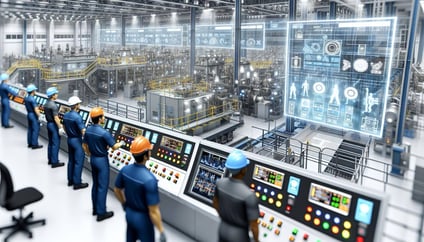Advanced Process Monitoring and Control Systems
Production schedulers are tasked with the challenging responsibility of optimizing manufacturing processes to meet demand while minimizing costs and maximizing resource utilization. In this quest for efficiency, the integration of advanced process monitoring and control systems has emerged as a game-changer.
By leveraging technologies such as PlanetTogether and integrating them with leading ERP, SCM, and MES systems like SAP, Oracle, Microsoft, Kinaxis, Aveva, and others, production schedulers can achieve unprecedented levels of control and insight into their operations.

Understanding Advanced Process Monitoring and Control Systems
At its core, advanced process monitoring and control systems are designed to provide real-time visibility into every aspect of the manufacturing process. From raw material procurement to production scheduling, inventory management, and quality control, these systems offer a holistic view of the entire supply chain. By collecting and analyzing vast amounts of data in real-time, production schedulers can identify inefficiencies, anticipate potential bottlenecks, and make data-driven decisions to optimize production.

Integration with ERP, SCM, and MES Systems
The true power of advanced process monitoring and control systems such as PlanetTogether lies in their seamless integration with existing ERP, SCM, and MES systems. By connecting these disparate systems, production schedulers can eliminate data silos and create a unified platform for managing all aspects of the manufacturing process.
This integration enables real-time data sharing across departments, streamlines communication between stakeholders, and ensures that everyone is working from the same set of accurate, up-to-date information.
One of the key players in this integration is PlanetTogether, a leading provider of advanced production scheduling software. PlanetTogether's robust scheduling capabilities enable production schedulers to create optimized production plans that take into account factors such as resource availability, production constraints, and customer demand.
By integrating PlanetTogether with ERP systems like SAP, Oracle, Microsoft Dynamics, or MES systems like Aveva, production schedulers can ensure that their scheduling decisions are aligned with broader business objectives and operational realities.

Benefits of Integration
The benefits of integrating advanced process monitoring and control systems with ERP, SCM, and MES systems are manifold. First and foremost, it allows for greater agility and responsiveness in the face of changing market dynamics. By having real-time visibility into production processes and supply chain operations, production schedulers can quickly identify and respond to disruptions, whether they be machine breakdowns, supply shortages, or unexpected changes in customer demand.
Furthermore, integration enables predictive analytics capabilities, allowing production schedulers to anticipate future demand patterns and proactively adjust production schedules accordingly. By leveraging historical data and machine learning algorithms, these systems can identify trends and patterns that human operators might overlook, enabling more accurate forecasting and planning.
Another significant benefit of integration is improved inventory management. By synchronizing production schedules with inventory levels and demand forecasts, production schedulers can optimize inventory levels, minimize carrying costs, and reduce the risk of stockouts or overstock situations. This not only improves operational efficiency but also enhances customer satisfaction by ensuring timely delivery of products.
Challenges and Considerations
While the benefits of integrating advanced process monitoring and control systems with ERP, SCM, and MES systems are clear, implementation is not without its challenges. One of the primary challenges is data integration. Ensuring seamless communication between disparate systems requires careful planning and coordination, as well as robust data governance policies to maintain data integrity and security.
Furthermore, cultural barriers can also pose challenges to integration efforts. Resistance to change, lack of buy-in from key stakeholders, and organizational silos can hinder the successful implementation of integrated systems. Therefore, effective change management strategies and stakeholder engagement are essential to overcoming these barriers and driving adoption.
Advanced process monitoring and control systems offer production schedulers a powerful tool for optimizing manufacturing operations and maximizing efficiency. By integrating these systems such as PlanetTogether with leading ERP, SCM, and MES systems like SAP, Oracle, Microsoft, Kinaxis, Aveva, and others, production schedulers can unlock new levels of visibility, agility, and control across the entire supply chain.
While challenges may arise during implementation, the benefits far outweigh the costs, making integration a worthwhile investment for any industrial manufacturing facility looking to stay ahead in today's competitive marketplace.
Are you ready to take your manufacturing operations to the next level? Contact us today to learn more about how PlanetTogether can help you achieve your goals and drive success in your industry.